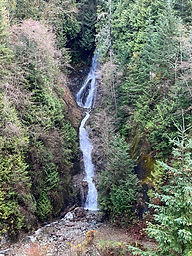Reclaiming Cultural Knowledge and Practices
- kc dyer
- Feb 5, 2024
- 4 min read
Updated: Mar 1, 2024
New book explores plants and healing in a cultural context

With snowdrops making an early appearance this year, we are all reminded of the uplifting power of plants. Whether it be blossoms pushing through snow drifts or the wider way plants can contribute to wellness, a new book by ethnobotanist Leigh Joseph may be just the resource you need.
Held By The Land: A Guide to Indigenous Plants for Wellness was published last spring by Quarto Books. The Watershed recently sat down for a chat with author and ethnobotanist Leigh Joseph.
Joseph says she has been working with plants in a cultural context for many years, and was inspired to write the book to help facilitate and promote Indigenous plant knowledge. As a member of the Squamish Nation, she's spent the past 15 years reconnecting to land and plant-based knowledge from an Indigenous perspective through both her academic pursuits and her cultural connections.
"I have personally reconnected more deeply with my cultural heritage through learning about, and building relationships with plants," she says. "I have also worked with other Indigenous communities, (and observed) shared interests and priorities across each community."
While completing her doctorate, Joseph, whose ancestral name is Styawat, was inspired to write the book after seeing how few Indigenous voices and perspectives were found in the literature. "This includes plant field guides that are primarily written by non-Indigenous authors," she adds.
This led her to begin efforts to reclaim cultural plant knowledge and practices, and to create culturally sensitive resources to support this renewal. "When I was doing my doctoral field work with my community, people kept bringing up the topic of wanting a plant book of Sḵwx̱wú7mesh (Squamish) knowledge to support their individual learning. People wanted a book that was informative but also useful."
So Joseph wrote one.
Held By The Land opens with shared teachings for deepening relationships with plants and the land, and then gets specific with local plant profiles to help with identification and habitat information, as well as offering a cultural context. "Anyone who loves plants and spending time in nature will benefit from this book," says Joseph. "In particular, if you are looking to build relationships and a deeper connection to plants and learn more from an Indigenous perspective, you will enjoy this book."
The book addresses the long history Indigenous people have of harvesting plants for both their nutritional and healing properties. Joseph points to a local example: "Stinging nettle is a great plant that is both a medicine and food. The young shoots of nettle are a wonderful spring green and can be utilized in stir fry, smoothies and pesto. Topically this plant is a great anti-inflammatory and can be infused into oils and applied to the skin or powdered and added into bath soaks. Nettle is a great plant to grow in a garden or planter box as well so as not to put pressure on wild nettle populations, that butterflies and other non-human life rely on."
Joseph is also founder of Skwalwen (Skwall-win) Botanicals, a skincare company, and is quick to point out the local plants that can be part of a beauty routine. "There are many plants that have great topical benefits that can be incorporated into your skincare or wellness routines. One example is fireweed, which has gently astringent and anti-inflammatory properties. When the flowers are dried and infused into oil or witch hazel they are great for topical use on the skin and can gently reduce redness."
Joseph says her background as a member of the Squamish Nation has been foundational in her work, including her writing. "I do this with an understanding that I have a responsibility to write in respectful ways that honour knowledge holders in my community and share the beauty of land-based and plant-based knowledge and relationships, but that doesn't exploit this knowledge. There are certain parts of knowledge that should stay within the community and I rely on community mentors and teachers to help me navigate the decision-making process around how to share information in ways that uplift Indigenous knowledge and increase Indigenous representation but that are respectful, reciprocal and responsible."
Joseph has been a practicing ethnobotanist for more than a decade.
"Ethnobotany is an interdisciplinary area of study and work and so the associated work of an ethnobotanist can range widely. For me, having a background in both Indigenous Science and western science was important for how I approach the work I do." She says that in order to create opportunities for her own and other Indigenous communities, it was important to have an understanding of plant ecology, biochemistry and restoration practices.
These days, Joseph also teaches at the University of Victoria and the Haida Gwaii Institute, as well as offering workshops outside an academic setting, via Skwalwen Botanicals. "It is always such a pleasure to work with students who are passionate and motivated to learn and engage with community and give back in the process of their studies."

Held By The Land was recognized as a BC bestseller in 2023 and Joseph is planning a card deck adaptation of the book that will be published in early April. She's also hard at work on an upcoming children's book. You can find Leigh Joseph (Styawat) at her website, and on Instagram.


Comentários